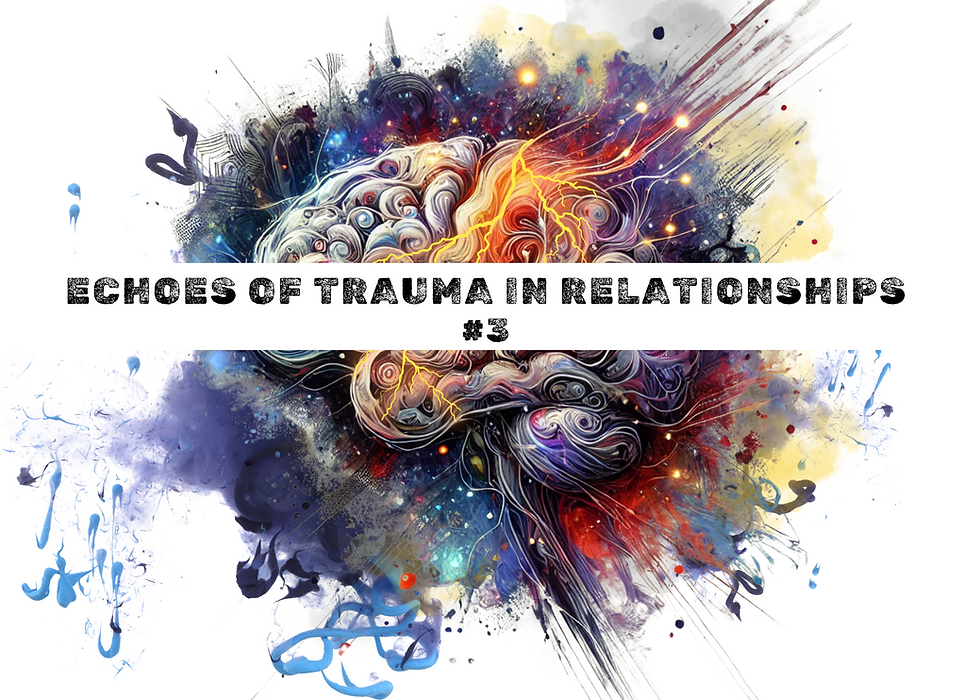Toxic Divorces
- Troy Rienstra

- Feb 27, 2025
- 5 min read
Divorce is never easy. But when it turns toxic, the real victims are often the children caught in the crossfire. The emotional and psychological damage inflicted by high-conflict separations, particularly cases involving parental alienation, can last for decades. Children, teens, and adolescents navigating these traumatic experiences often suffer from anxiety, depression, and attachment issues that ripple into adulthood.
Unfortunately, toxic divorces and parental alienation are becoming increasingly common in today’s society. With family court cases skyrocketing and more parents weaponizing children against one another, we are seeing an alarming rise in cases where children are used as pawns rather than protected as individuals. Studies indicate that the increase in narcissistic personality behaviors, social media-fueled manipulation tactics, and lack of accountability in the legal system have contributed to this growing crisis.
In this deep dive, we’ll examine how toxic divorces impact children, the ways manipulative parents operate, and what we as a society can do to mitigate the harm.
high-Conflict Divorces
Understanding the Long-Term Psychological Damage
According to a study by Harvard University, children of high-conflict divorces are significantly more likely to suffer from depression, substance abuse, and poor academic performance compared to children whose parents separated amicably. Another report from Yale University found that exposure to prolonged parental conflict increases cortisol levels in children, leading to chronic stress and emotional instability.
Research from Columbia University indicates that children from high-conflict divorces experience a threefold increase in the likelihood of developing PTSD, with symptoms including hypervigilance, emotional detachment, and recurring nightmares.
The American Psychological Association (APA) states that children caught in toxic divorces often experience attachment disorders, difficulty forming healthy relationships, and a higher likelihood of engaging in self-destructive behaviors. The stress from watching their parents battle in court, manipulate their emotions, and use them as pawns can create lifelong emotional scars.
What is Parental Alienation?
Parental alienation is one of the most insidious forms of psychological manipulation seen in high-conflict divorces. This occurs when one parent systematically attempts to damage the child's relationship with the other parent, often by:
Making false allegations of abuse or neglect
Controlling and filtering the child’s perception of the other parent
Rewarding loyalty and punishing affection toward the other parent
Encouraging the child to fear, despise, or distrust the alienated parent
A Princeton University study found that children subjected to parental alienation are more likely to develop trust issues, emotional instability, and identity struggles as they grow older. They also face a 50% higher risk of developing anxiety and depressive disorders later in life.
Additionally, a Stanford Law Review study on family court cases found that parental alienation is frequently overlooked by courts, with manipulative parents often winning custody due to their ability to present themselves as the "stable" parent while undermining the other. This happens largely because family courts prioritize maintaining stability for the child, often equating stability with the parent who appears more composed, financially secure, or legally prepared.
Manipulative parents exploit this by carefully curating their image, using legal loopholes to their advantage, and portraying themselves as the more responsible caregiver. Furthermore, they often employ financial control tactics, such as excessive legal battles, drawn-out custody disputes, and strategic use of child support or legal fees, knowing that the targeted parent may struggle to afford prolonged court proceedings. This financial strain can lead the court to perceive the targeted parent as less capable of providing for the child, when in reality, they are being systematically outmaneuvered and economically weakened.
Judges and attorneys may not be adequately trained to recognize these manipulation tactics, making it difficult to distinguish true concerns from calculated deception. The high caseload of family courts, reliance on outdated custody evaluation methods, and pressure to resolve cases quickly can lead to decisions that inadvertently favor the more persuasive or well-resourced parent rather than the one truly acting in the child's best interest.
Family law attorneys across the country are now reporting a dramatic rise in these cases, with judges struggling to decipher true concerns from manipulative tactics.
Toxic parents don’t always appear destructive at first glance. Many are skilled manipulators, crafting an image of being the "protective" or "wronged" parent while subtly controlling narratives.
Common Tactics of a Manipulative Parent:
Manipulating Teachers, Coaches, and Friends – They paint themselves as the devoted parent while casting the other as irresponsible or abusive.
Playing the Victim in Court – They present exaggerated or false claims to gain legal advantage, most of the time not even presenting actual evidence in support of their claim(s).
Gaslighting the Child – Making the child question their memories and emotions about the alienated parent.
Weaponizing Emotional Guilt – Guilt-tripping children into choosing one parent over the other.
Blocking Communication – Refusing phone calls, letters, or any attempts at connection between the child and the alienated parent. Refusing to provide the targeted parent with event date information or switching parenting time.
Studies from Cornell University’s Psychology Department reveal that children exposed to manipulative parental behaviors experience higher levels of confusion, self-blame, and emotional distress, which often leads to long-term identity struggles.
The Long-Term Consequences
1. Increased Risk of Mental Illness
Children of toxic divorces are at a threefold risk of developing PTSD, according to a Columbia University study. They may suffer from recurring nightmares, emotional detachment, or chronic anxiety.
2. Struggles with Relationships and Trust
A Stanford University report found that children from high-conflict divorces are twice as likely to experience relationship difficulties in adulthood, often struggling with trust and commitment.
3. Higher Likelihood of Substance Abuse
Research from MIT suggests that exposure to prolonged parental conflict increases the risk of teenage substance abuse by 40%, as children use alcohol or drugs to cope with emotional distress.
4. Academic Decline and Career Challenges
A Dartmouth College study found that children from high-conflict divorces were 30% more likely to drop out of college and struggle with long-term career stability.
What Can We Do?
Educate the Court and School System
School counselors and legal professionals need training to recognize signs of parental alienation and toxic manipulation.
Encourage Therapy and Counseling
Children involved in toxic divorces often need professional support to process their emotions. Schools and community centers should offer accessible counseling services.
Hold Manipulative Parents Accountable
Courts should enforce consequences for parents found guilty of severe alienation, including mandatory co-parenting education and psychological assessments.
Divorce doesn’t have to destroy children, but a toxic one absolutely will. Recognizing the tactics of manipulative parents, understanding the long-term consequences, and advocating for healthier co-parenting strategies can change the trajectory for countless young lives.
Parental alienation and toxic divorces are becoming disturbingly prevalent in today’s society. With the increase in legal battles over custody and the emotional harm inflicted on children, awareness and proactive intervention are critical.
Children deserve love, stability, and emotional security. It’s time we start putting their well-being first.
Support the needs of your community and keep growing
-Troy Rienstra
_edited.png)



Comments